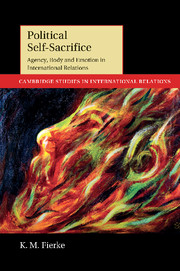Crossref Citations
This Book has been
cited by the following publications. This list is generated based on data provided by Crossref.
KOSCHUT, SIMON
2014.
Emotional (security) communities: the significance of emotion norms in inter-allied conflict management.
Review of International Studies,
Vol. 40,
Issue. 3,
p.
533.
Graham, Sarah Ellen
2014.
Emotion and Public Diplomacy: Dispositions in International Communications, Dialogue, and Persuasion.
International Studies Review,
Vol. 16,
Issue. 4,
p.
522.
Hellmich, Christina
2014.
How Islamic is al-Qaeda? The politics of Pan-Islam and the challenge of modernisation.
Critical Studies on Terrorism,
Vol. 7,
Issue. 2,
p.
241.
Harcourt, Wendy
Ling, L. H. M.
Zalewski, Marysia
and
Swiss International Relations Colle
2015.
Assessing, Engaging, and Enacting Worlds.
International Feminist Journal of Politics,
Vol. 17,
Issue. 1,
p.
158.
Hedges, Paul
2015.
Burning for a Cause: Four Factors in Successful Political (and Religious) Self-Immolation Examined in Relation to Alleged Falun Gong “Fanatics” in Tiananmen Square.
Politics and Religion,
Vol. 8,
Issue. 4,
p.
797.
Leander, Anna
2015.
Ethnographic Contributions to Method Development: “Strong Objectivity” in Security Studies.
International Studies Perspectives,
p.
ekv021.
2016.
Affective Communities in World Politics.
p.
267.
Roach, Steven C
2016.
Why moral commitments matter: mapping the ethics and politics of responsible and accountable global governance.
Cambridge Review of International Affairs,
Vol. 29,
Issue. 1,
p.
309.
Reinke de Buitrago, Sybille
2016.
The role of emotions in US security policy towards Iran.
Global Affairs,
Vol. 2,
Issue. 2,
p.
155.
2016.
Affective Communities in World Politics.
p.
111.
Petrova, Margarita H.
2016.
Rhetorical Entrapment and Normative Enticement: How the United Kingdom Turned From Spoiler Into Champion of the Cluster Munition Ban.
International Studies Quarterly,
Vol. 60,
Issue. 3,
p.
387.
Dolan, Thomas M.
2016.
Go Big or Go Home? Positive Emotions and Responses to Wartime Success.
International Studies Quarterly,
Vol. 60,
Issue. 2,
p.
230.
Fierke, K.M.
2016.
Emotions as Moral Judgments: Ethics, Science, and Global Poverty.
International Studies Review,
Vol. 18,
Issue. 2,
p.
393.
2016.
Affective Communities in World Politics.
p.
72.
2016.
Affective Communities in World Politics.
p.
29.
Marlin-Bennett, Renée
2016.
Everyday rules and embodied information: anti-money laundering/counter-terrorist financing practices and radio frequency identification tags as security politics.
Critical Studies on Security,
Vol. 4,
Issue. 2,
p.
169.
2016.
Affective Communities in World Politics.
p.
1.
Clément, Maéva
Lindemann, Thomas
and
Sangar, Eric
2017.
The “Hero‐Protector Narrative”: Manufacturing Emotional Consent for the Use of Force.
Political Psychology,
Vol. 38,
Issue. 6,
p.
991.
Fierke, K. M.
2017.
Consciousness at the Interface: Wendt, Eastern Wisdom and the Ethics of Intra-Action.
Critical Review,
Vol. 29,
Issue. 2,
p.
141.
Clément, Maéva
and
Sangar, Eric
2018.
Researching Emotions in International Relations.
p.
1.



